 Text: Psalm 36:1-6
Text: Psalm 36:1-6
When it comes to sins against the lives of society’s unwanted, these stem entirely from selfishness. As the Psalmist reminds us, a wicked man flatters himself and has no fear of God. Rather, he plots trouble for his own selfish desires. Is this not the base of the claim that the pre-born are inconvenient in their timing, or the elderly when they are consuming resources that the foolish man thinks could be better used elsewhere, or the disabled and troubled who are told their lives are somehow not worth living?
It is selfish to consider such possibilities because God alone has brought about their life and He alone is able to end it. The wise man seeks not to understand God’s motivation or to correct God’s plan, but rather seeks to help the pre-born’s mother provide for her child’s needs, visits the elderly to give them company and learn from their life, and engages with those whose life is difficult in order to ease their burdens.
As verses 5-6 remind us, the Lord is in control of all things, and His love is beyond our understanding. But He saves all for His purposes, and we are given to simply receive with thanksgiving.
Let us pray: Our Heavenly Father, we come before in You in awe of Your continued love and faithfulness towards us. Help us to act wisely and not like wicked men, to protect those to whom You have given life, no matter if they are pre-born, elderly, or in need of special care. Through Jesus Christ, our Lord. Amen.
(Caleb Stoever, Sem II)
Convocation: The Delayed Eschatological Vision
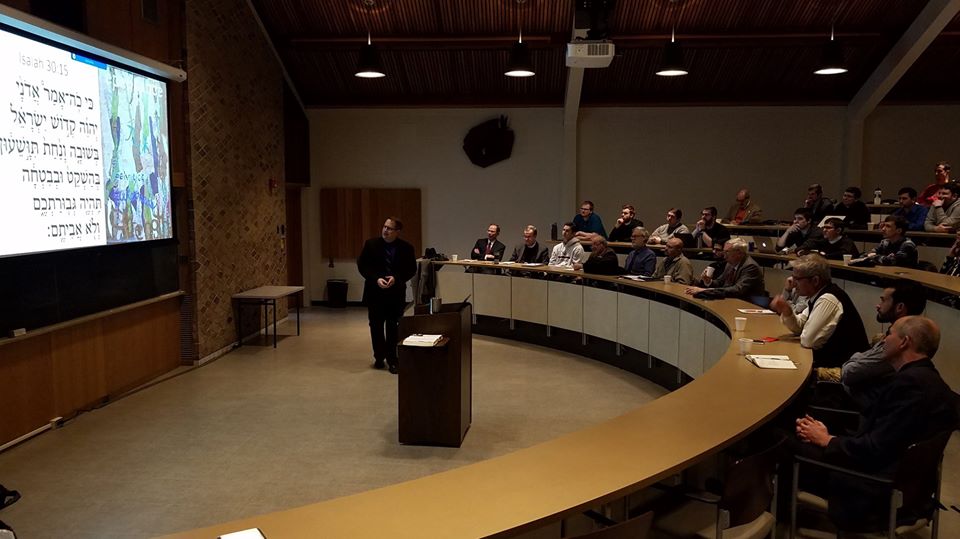
Wednesday’s convocation featured Dr. Ryan Tietz, Assistant Professor of Exegetical Theology, who earned his PhD this fall. His presention, “Wait for It: Isaiah 30 as Mirror Text of the Book of Isaiah,” was based on the themes he explored in his dissertation.
“Isaiah chapter 30 is the Nebraska of the book,” Dr. Tietz began (who earned his B.A. from Concordia Nebraska before going to seminary). “It’s flyover country. It doesn’t look like much, and hasn’t had much of an impact on the Church, but when you look closer you discover its complexity. You find yourself reading through this great mosaic of images that reflects the tension throughout the book of Isaiah.”
The book of Isaiah weaves together several motifs: human rebellion, that God will restore His children, but that He will give the rebellious sons what they want and delay salvation. Isaiah 30 acts as a summary statement for all these themes.
Both chapter 1 and chapter 30 of Isaiah start with the charge of rebellious sons—“Which is a big deal,” Dr. Tietz explained. “It’s a capital offense in Deuteronomy. God has already done everything required to be a good father, but they’ve failed in their obligations. ‘You are dead to me. Go play in traffic.’”
The tragedy is that they get what they want. The mission hymn “Hark, the Voice of Jesus Calling” uses the line, “Here am I, send me, send me,” from Isaiah 6:8, but does not capture the verse that follows: “And he said, ‘Go, and say to this people: ‘Keep on hearing, but do not understand; keep on seeing, but do not perceive’” (Is. 6:9). Isaiah’s mission from God is to blind them lest they see with their eyes. His mission is to give the rebellious sons what they want, lest they turn and be healed.
We see it again in chapter 30, verse 10, when God speaks of the lying children “who say to the seers, ‘Do not see,’ and to the prophets, ‘Do not prophesy to us what is right.’” Basically: “Stop having an involuntary vision!”
“It’s absurd,” Dr. Tietz said. “That’s what it means to be rebellious. Verses 9–11 paint a picture of a people who are willfully ignorant.”
But then always comes the reversal. In 30:18: “Therefore the Lord waits to be gracious to you,” and an even more pointed counterpoint to verse 10 comes a couple of chapters later in 35:5: “Then the eyes of the blind shall be opened, and the ears of the deaf unstopped.”
This constant ebbing and flowing of the tension remains even to the final verse of the book (66:24): “And they shall go out and look on the dead bodies of the men who have rebelled against me. For their worm shall not die, their fire shall not be quenched, and they shall be an abhorrence to all flesh.”
“Go back to verse 23 to feel better,” Dr. Tietz recommended.
Isaiah 30:18 epitomizes the tension of waiting that is at the heart of the book. It is the summary statement of the book of Isaiah: that salvation isn’t about doing anything—it’s returning to rest. Trust Yahweh, trust Yahweh.
“Therefore the LORD waits to be gracious to you,
and therefore he exalts himself to show mercy to you.
For the LORD is a God of justice;
blessed are all those who wait for him.”
Dr. Tietz’s dissertation, “The Delayed Eschatological Vision: The Theological and Hermeneutical Function of Isaiah 30” ultimately tipped the scales at 246 pages. “It’s a heavy weight,” he admitted, “but there’s always more to be done, more to be discovered.” For those who would like to learn more, Dr. Tietz has submitted his thesis to www.proquest.com, a database of dissertations. It is not yet available, but should be soon.
Life Devotion
 Text: Psalm 22:22-31
Text: Psalm 22:22-31
Focus Verses: “You who fear the Lord, praise him! All you offspring of Jacob, glorify him, and stand in awe of him, all you offspring of Israel! For he has not despised or abhorred the affliction of the afflicted, and he has not hidden his face from him, but has heard, when he cried to him” (verses 23-24).
David wrote this psalm to remind and encourage God’s people to praise and worship Him. But perhaps you just don’t feel in the mood to praise anyone. You look back on the last few days, months, years, and what stands out most are the afflictions you suffer. Perhaps you’re burdened with guilt, pressure, or loneliness.
Well, David knew suffering too. Earlier in the psalm he says that he was scorned, despised, and mocked—made to feel less than human. He is even so bold as to shout, “My God, my God, why have you forsaken me?” He felt as though even God had abandoned him.
But had God really turned His back on David? No, of course not! David trusted that the Lord would deliver him from his affliction. What’s more, David trusted that the Lord would deliver the whole world from its affliction. David rightly believed that you will be rescued from your suffering! Many generations after David, Jesus would join the psalmist in crying out “My God, my God, why have you forsaken me?” on the cross (Matt. 27:46).
Jesus was afflicted, so that we would be delivered from our afflictions. God the Father did not ultimately abhor His Son, but heard Him when He cried to Him and raised Him from the dead Easter morning. So also we will be raised when Christ returns to a life free of guilt, pressure, and loneliness. Let us therefore, in spite of our troubles, glorify the Lord!
Let us pray: Dear Lord, through Your Son’s death and resurrection You have given to us salvation. Please help us remember that Your mercy is infinitely greater than our afflictions, so that we may glorify You. Amen.
(Daniel Fickenscher, Sem III)
Life Devotion
 Text: Psalm 22:9-21
Text: Psalm 22:9-21
No one goes through life on this earth without suffering, pain, and loss. Without Jesus, life would be little more than a series of losses leading to the final loss of death. But Jesus will not leave us in such hopelessness. Martin Franzmann put it eloquently in LSB 834: “O God, O Lord of Heaven and Earth / Thy living finger never wrote / that life should be an aimless mote, /a deathward drift from futile birth.” Jesus always pulls us up to something greater, something more, something beautiful.
Jesus himself experienced great loss on our behalf. The verses for this meditation, Psalm 22:9-21, are part of the psalm that more than any other expresses the depths of the suffering that Jesus endured in His own body on the cross—the suffering, pain, and death that we all deserve. But Jesus’ suffering pulls us up from our sin, misery, and suffering, to life and hope.
In the famous resurrection icon, Jesus grasps Adam’s hand, pulling him up from his grave. That is our eternal destiny. In Jesus, there is forgiveness of sins, life, and salvation. There is hope for a future, a destiny beyond what we can see but that we will one day fully know. Verse 10 proclaims, “from my mother’s womb you have been my God.” These are words about Jesus, but they are also words about us. Jesus’ Father is our Father—and in Jesus, we will stand before His merciful face for all eternity.
Let us pray: Heavenly Father, You have been our God from before our birth. In Your mercy, through Jesus Your Son, bring us through this vale of tears to Yourself in heaven. Amen.
(Josef Muench, Sem II)
Life Devotion
 Text: Psalm 22:1-8
Text: Psalm 22:1-8
Focus verse: “To you they cried and were rescued; in you they trusted and were not put to shame.” (Verse 5)
The words every pregnant mother and father fear hearing are, “Your baby is going to die; she is incompatible with life.
“But you do have options,” the doctor goes on. “We can therapeutically terminate the fetus.”
Silence. Silence from the doctor. Silence and screaming all at once in your mind. Why, God? Why us, why my baby? Why have you left us, what have we done? What do we do?
Therapeutic termination—murder? Murder the one You have given me because a doctor has tried to predict the future? No, surely not! Which of us is compatible with life? Your Word says that we are already dead in trespasses and sins. Our lives were never ours; they are Yours. You are the One who has come to us to care for, love, and protect us! You are the One who loved us and sent Your only Son to die that I and my children might live. In my Baptism, I received Your Spirit, which brings me life and reminds me of the love and compassion You showed me.
You gave me this life to care for, to love and to protect. So I will cry to you, Lord, because You are the one who rescues us. We trust, and You do not put us to shame. You love us with an everlasting love, which brings us everlasting life.
Let us pray: Heavenly Father, we give thanks that you have shown us that true life is more than what we see or comprehend because You have made us eternally Yours. Forgive us when we do not value the life You give to us, which You have sanctified in our baptism and into faith. Keep us to life everlasting. In Jesus’ name, Amen.
(Brittni Brown, Deaconess Intern)
Life Devotion
 Text: Psalm 19
Text: Psalm 19
Focus verse: “More to be desired are they than gold, even much fine gold; sweeter also than honey and drippings of the honeycomb.” (Verse 10)
What are “they”? “They” are what was previously mentioned: the law, the testimony, the precepts, the commandments, and the rules of the Lord, more to be desired than gold. In keeping them there is great reward. “They” are of the Lord.
But errors, faults, sins, and transgressions are of the world. As Christians, we are called to seek the law of the Lord and, in Christ, we will revive the soul of the world. We are called to speak the testimony of the Lord and make wise the simple secularists. We are called to hear the precepts of the Lord and follow His commands so that our eyes would be enlightened, lest we sleep the sleep of death. We are called to fear the Lord and keep His decrees and thereby sanctify ourselves and the world. We are called to live in Christ, and he who is in Christ will be blameless and innocent of great transgression. As Christians, we are called to seek the things above, where Christ is—we are called to seek Christ. Seeking Christ and walking in His way is our religion.
Yet ours is not a gnostic religion, it is an incarnate religion because we have the Incarnate God. Therefore our religion takes an incarnate, not gnostic, form. Religion that is pure and undefiled before God the Father is this: to visit orphans and widows in their affliction, to adopt children and care for mothers, to take our own mothers and fathers into our homes, to build Christian hospitals, orphanages, and schools, and to keep oneself unstained from the world.
Let us pray: Heavenly Father, we confess that we have not always kept Your commandments perfectly, that we do not always love our neighbor or You rightly. We give thanks that You have visited us in Your body, keeping the law perfectly for our sake. Help us to love our neighbor as You have loved us. In Jesus name, Amen.
(Ian Kinney, Sem II)
Life Devotion

Text: Psalm 17:8-15
Focus Verse: “Keep me as the apple of your eye; hide me in the shadow of your wings.” (Verse 8)
The phrase “apple of my eye” commonly refers to someone or something that one cherishes above all else. The phrase is used three times in the Old Testament, in Deuteronomy, Psalms, and Zechariah, to refer to what God cherishes above all else. In each case, the apple of God’s eye is His people. Yes, people—not one single person, but all His people. In Psalm 17:8, David asks God to keep him as the apple of His eye—but what of all the others who are also loved and cherished by God? It is clear that God has room for each of His creations to be the most precious, most beloved in His sight.
And what does He do for those who are the apple of his eye? He keeps watch over them and protects them. David says that God “fills their womb with treasure; they are satisfied with children.” God’s treasure, the apple of His eye, He places in the womb where mother and father can guard and protect and fully enjoy the gift they have been given to care for. God’s gift, His creation, is given to us to care for and to protect. It is the responsibility of each of us to take the task He has given to us with utmost seriousness, but also to remember that He is the One in whose steadfast love and outstretched wings we seek refuge when we fall short of what He has called us to do.
Let us pray: Dearest Lord, You see in us what we cannot see in ourselves and refuse to see in those around us. Remind us today that we are the apples of Your eye and that You entrust us to care for each of Your precious creations. Amen.
(Paul W. Marks, Sem II)
Life Devotion
 The Epiphany of Jesus
The Epiphany of Jesus
Text: Psalm 67
Focus Verse: “God, our God, shall bless us.” (Verse 6)
During the time of Epiphany, the Church celebrates the unveiling of God in his son, Jesus Christ. The light slowly unfolds. At the start, only one Jewish girl knew about the coming of the Messiah, this child Jesus within her womb. Yet what began with Mary soon was known by her husband Joseph, by the shepherds, the wise men, then Jerusalem, the light growing and spreading throughout the world. Through this child within Mary’s womb, God would be gracious to the world, would make His face to shine upon the world.
Psalm 67 says, “God, our God, shall bless us.” As the nature of God is revealed to us, we know him to be a God who brings blessing. Simply the birth of this baby Jesus is a blessing: God dwells with us. But when He comes to dwell with us, He brings light and life. He dies on the cross so that we might have life. God shall bless us and has blessed us, our God who gives us the breath in our lungs and the beating of our heart, our God who gives us life eternal. And for this life, “let the people praise you, O God; let all the peoples praise you!”
Let us pray: Heavenly Father, You have blessed us with light and life. Give us eyes to see that light and life, that we may ever praise you for these your gifts. Amen.
(Martin Hill, Sem I)
Life Devotion
 Text: Psalm 17:1-7
Text: Psalm 17:1-7
Focus Verse: “Hear a just cause, O Lord; attend to my cry! Give ear to my prayer from lips free of deceit!” (Verse 1)
Can we read Psalm 17 without being convicted of our sin? Who among us has held fast to the Lord’s paths, never straying or slipping? Yet, thanks be to God, our prayer is based not on our purity but on Christ’s!
Thus our prayer in these end times is ever that the Lord may “hear a just cause,” and we lean always on God’s mercy and faithfulness. This is especially true as we pray for the tiniest and weakest and sickest among us who, if they even have ears to hear, may be deafened by the world’s lies that their lives have no purpose.
Yet God is the “Savior of those who seek refuge from their adversaries.” This is most certainly true for the frail and vulnerable—and at the same time, God’s mercy and justice is also meant for those who have been deceived by the world’s fear and lies, including parents who have been convinced to kill their children, children who have been convinced to kill their parents, and doctors who have been convinced to take rather than preserve life.
We thus pray for the lives of the frail, and for the repentance and healing of those who are blinded by Satan’s darkness. For the true adversaries of the Lord are sin and Satan and all his horde, yet God is still merciful toward us. And so we pray, certain that our Creator does hear our words and shows His love to us and all His creation.
Let us pray: Heavenly Father, in Your mercy You listen to our prayer for the sake of Christ’s sinlessness. Grant that our lips may be free of deceit as we seek to defend life and protect the lives of all people from Satan’s deadly power. Through Jesus Christ, our Lord. Amen.
(Bethany Stoever, 2nd-Year Deaconess Student)
LCMSU Conference at CTSFW
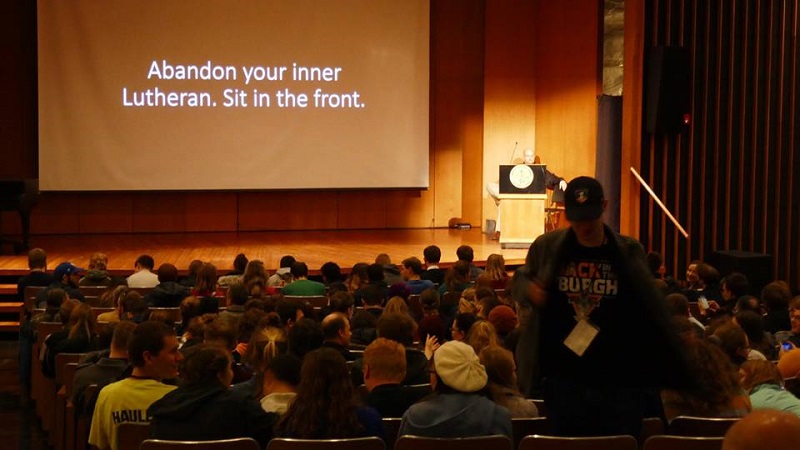
The best part of this sign is that it largely worked. About 300 college students and their campus pastors are with us this afternoon and evening for day three of the LCMS U conference, many of whom actually sat in the first 15 rows of seats in Sihler Auditorium rather than the back 20 as we welcomed them onto campus. Most of the conference is taking place at Purdue University Fort Wayne down the road, but we had them on the 4th until 10:30 p.m., when the day concluded with Compline in Kramer Chapel.
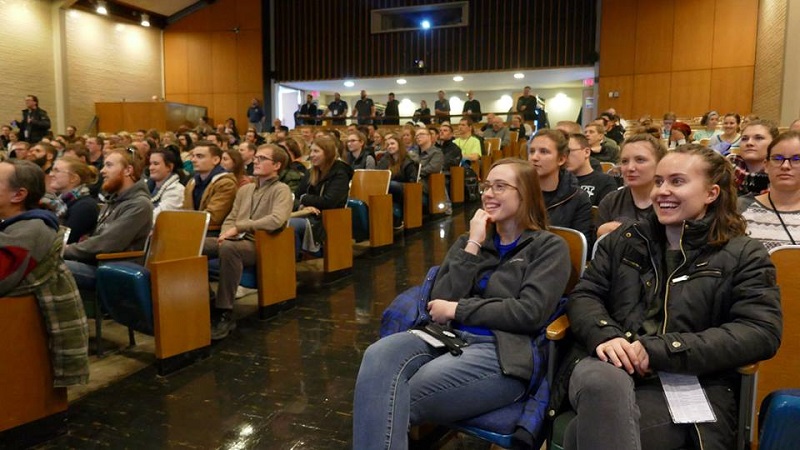 The LCMS U Conference took place in Fort Wayne from January 2-5, though we only had them on campus for the afternoon and evening of the 4th. If you were watching the Evening Prayer service with us on Friday (or we able to join us on campus), the many young people filling in the pews were these attendees.
The LCMS U Conference took place in Fort Wayne from January 2-5, though we only had them on campus for the afternoon and evening of the 4th. If you were watching the Evening Prayer service with us on Friday (or we able to join us on campus), the many young people filling in the pews were these attendees.
The following pictures will take you through a quick summary and timeline of some of the events of the afternoon. The students had three sectionals throughout Wyneken and Loehe Halls that day, with a choice between 17 professors, instructors, pastors, and deaconesses lecturing on 18 different topics.
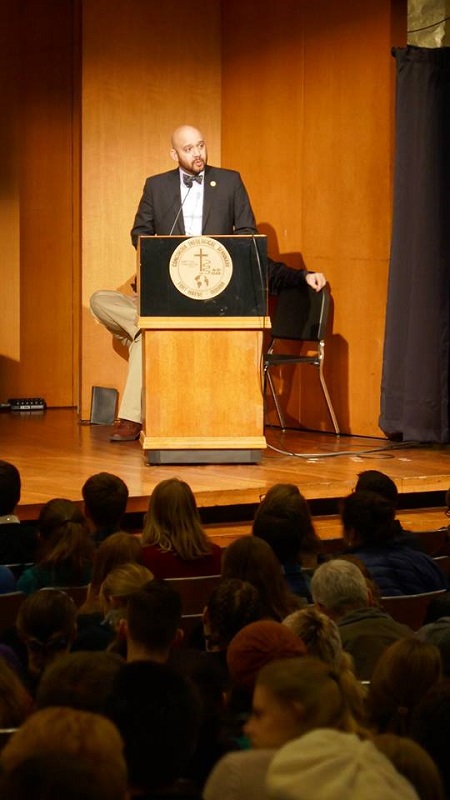
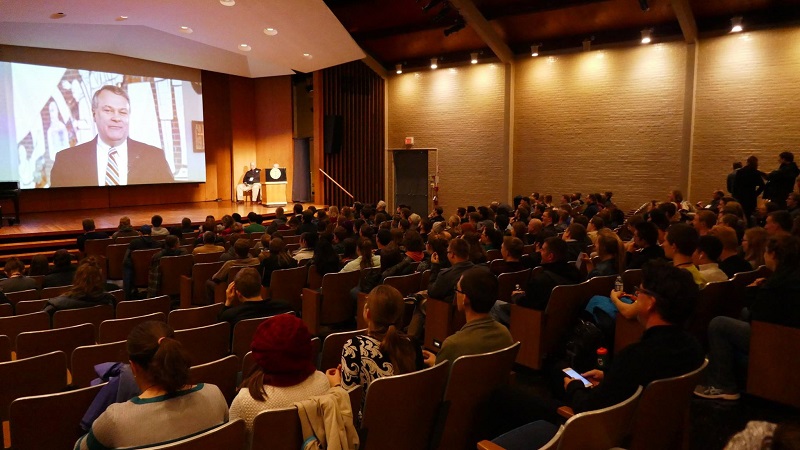
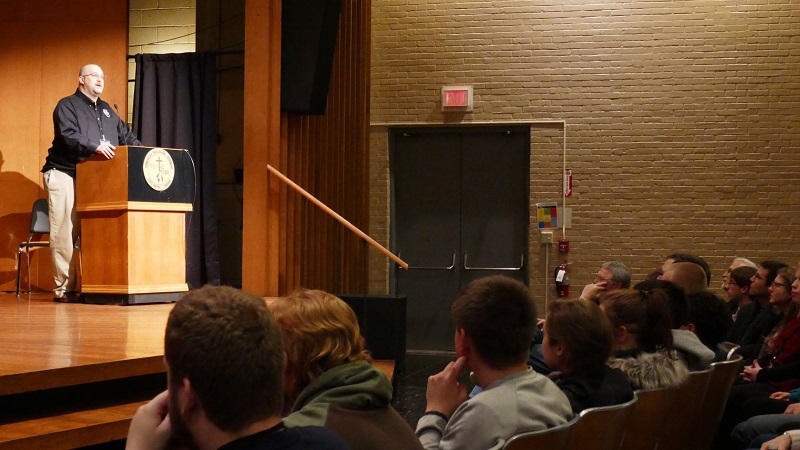
After the laughter died down he added, “Even though I’m not serving in that capacity anymore, I’m still supporting it.” The focus of this year’s LCMS U conference was “Witness,” particularly in a college context.
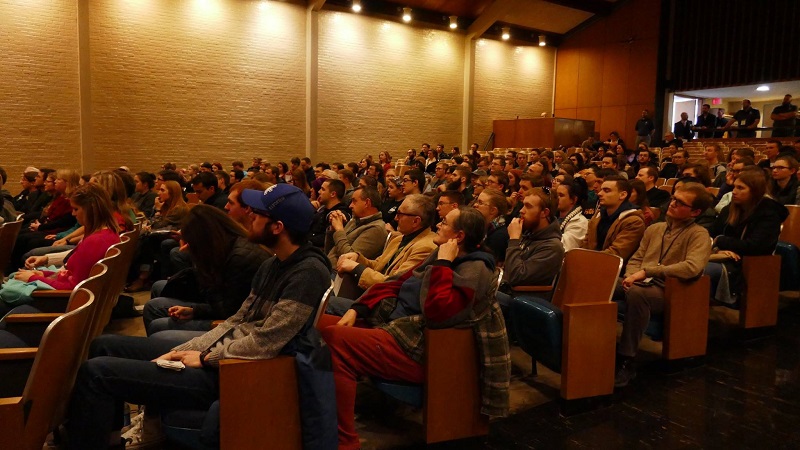
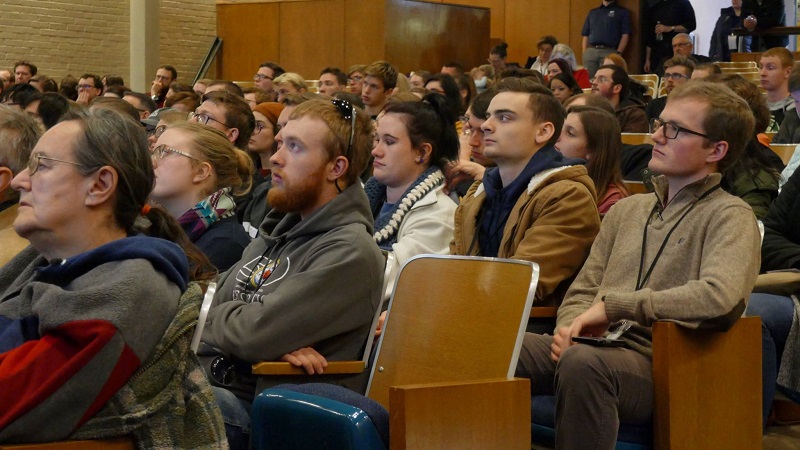
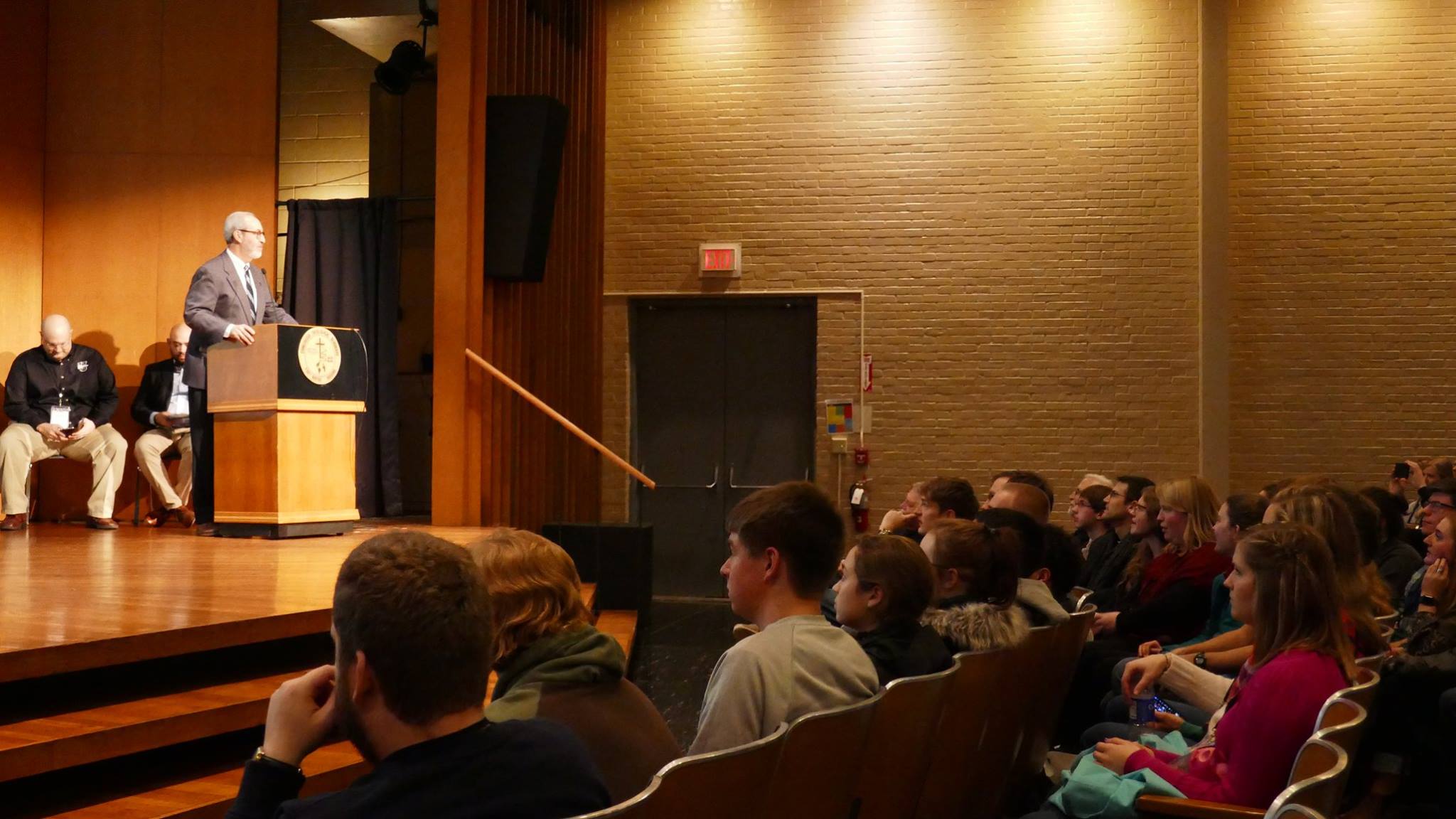
The opportunities he spoke of in particular were for business and office roles, which need neither theological nor language training. The Church has need of all her members, serving with all the talents and the interests given to her young people.
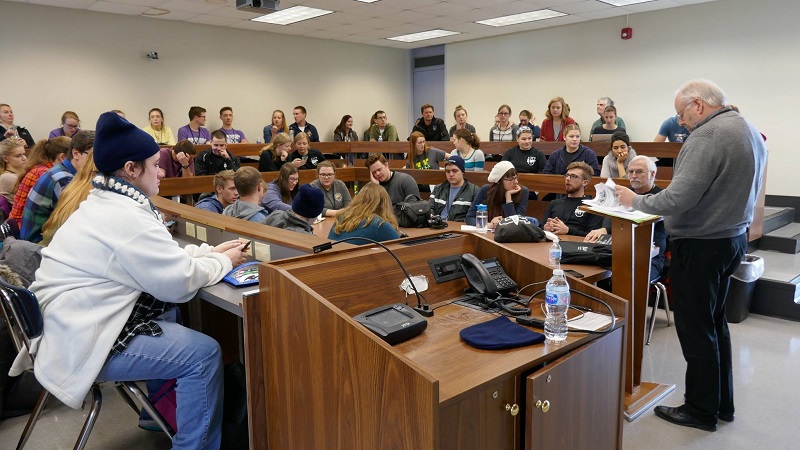
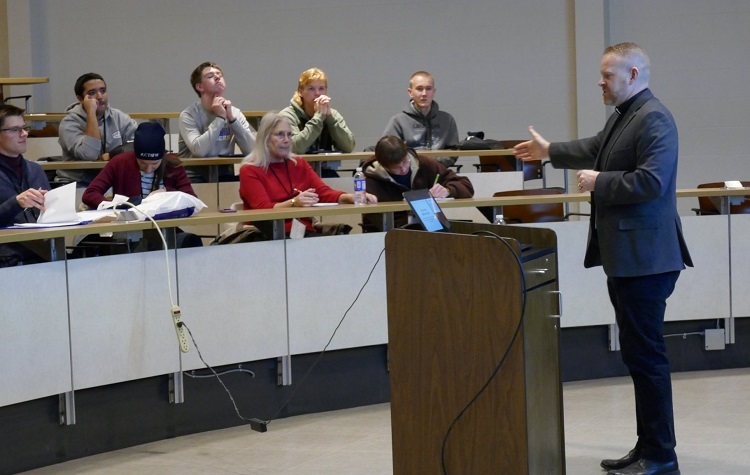
Other courses throughout the afternoon tackled such subjects as the problem of evil and suffering, morality and ethics (good works), spiritual warfare, celibacy, apologetics, international witness, dating and witnessing, and courses like “Gossip Girls (and Boys): The Death of Witness,” “Male and Female in the World of Caitlyn Jenner,” and “The Small Catechism as an Evangelism Tool.”
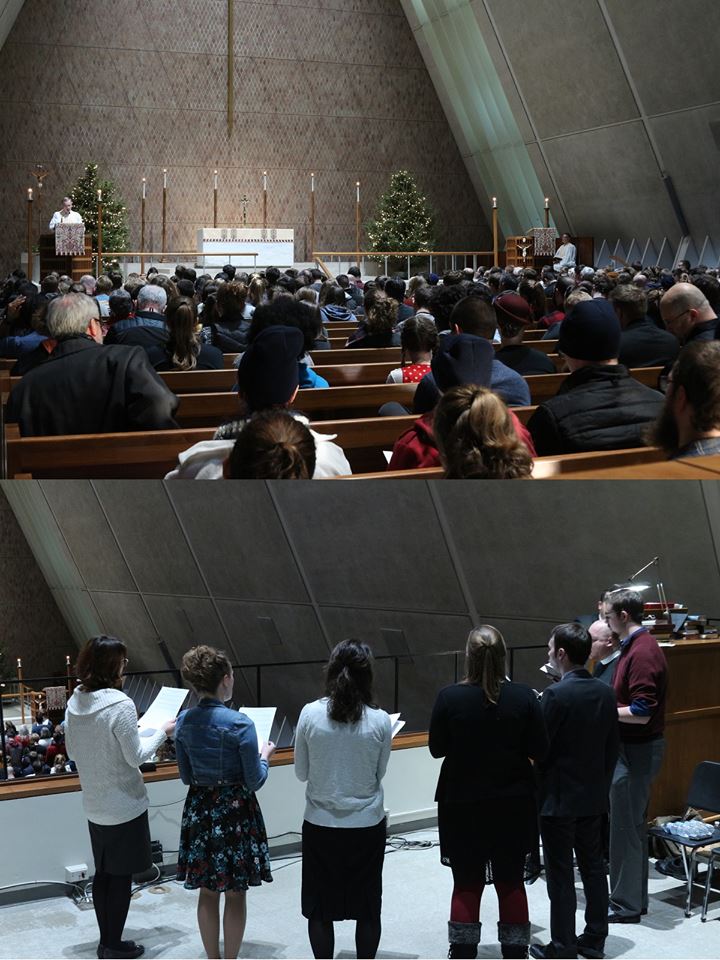
Not caught on camera: the attendees were released from the sectionals at 8 p.m. for pizza, after which they split their time between a bonfire, games in the Student Commons, and basketball and volleyball in the gym. Our visitors left campus at 10:30 p.m., after closing out the day in prayer.
